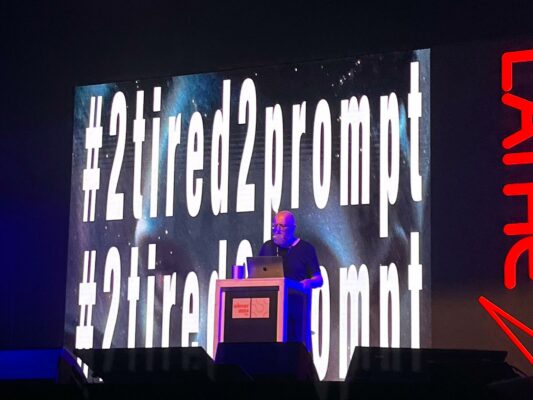Search
To search for an exact match, type the word or phrase you want in quotation marks.
A*DESK has been offering since 2002 contents about criticism and contemporary art. A*DESK has become consolidated thanks to all those who have believed in the project, all those who have followed us, debating, participating and collaborating. Many people have collaborated with A*DESK, and continue to do so. Their efforts, knowledge and belief in the project are what make it grow internationally. At A*DESK we have also generated work for over one hundred professionals in culture, from small collaborations with reviews and classes, to more prolonged and intense collaborations.
At A*DESK we believe in the need for free and universal access to culture and knowledge. We want to carry on being independent, remaining open to more ideas and opinions. If you believe in A*DESK, we need your backing to be able to continue. You can now participate in the project by supporting it. You can choose how much you want to contribute to the project.
You can decide how much you want to bring to the project.

Sonar is not just a premier digital culture event and a key tourist and cultural attraction in Barcelona; it is also a forum for contemplating significant contemporary issues. This year, the central theme of Sonar +D 2024 was artificial intelligence (AI). Sonar + D 2024 began with a round table, which had an agile moderation by Eduardo Alarcón and Antònia Folguera (curator of Sonar + D) who set the tone right from the start with a review of some of the lines of their curricula and some musical incursions to introduce some of the aspects to be discussed. The central theme, “Generating Panic?” underscored the idea that panic often stems from ignorance, and the true risk lies in collective panic. Each of the participants in this relaxed discussion agreed, from their different perspectives and experiences, that ambivalence is the key word. As journalist Marta Peirano explained, AI can be liberating (in the same way that photography was in relation to painting, which not only did not make it disappear, but liberated it). The problem arises when AI is controlled solely by companies or corporations in favor of their own profits.
Marta Handenawer, promoter of Domestic Data Streamers, pointed in the same direction and advocated focusing on specific aspects of this great umbrella that is AI, in order to detect specific problems and find concrete solutions. One example is the work done by Domestic Data Streamers with memory and memories with people in the early stages of dementia or displaced people.
Another example of the work of artists in latent space is that of Rebecca Fiebrink, linked to the University of the Arts London, who in 2009 created the Wekinator software, a pioneer in machine learning which, at the antipodes of extractivist models, is used by music professionals based solely on their own data and materials.
Naturally, Varoufakis’ concept of Technofeudalism also hovered over the conversation. And, as scientist Artur Garcia (Barcelona SuperComputer Centre) concluded, while the promise of technology is economic, science tries to create new models. Models that can be very useful, for example, in therapy, since AI is excellent at recognizing patterns and mechanisms.
AI was confronted with flashes of “human wisdom” from statements such as those of Gary Markus, psychologist, cognitive scientist and author, who invited to rephrase the question and go back to the origins: We are at a moment in history in which we should ask What AI we want? And can gen AI get us there? Or we need to consider new approaches that are more reliable and more tractable?
From other perspectives, Sasha Costanza-Chock’s performative lecture on algorithmic necropolitics during the end of the Empire became a multimedia denunciation against the increasing deployment of AI systems (from Puerto Rico to Palestine) to monitor, control and condemn to death subjects who resist the assimilation of the powers that be, i.e. heteropatriarchy, white supremacy, cisnormativity, capitalism and colonialism.
Creativity at Sonar + D has not only come from the hand of music or installations but two writers, Joanne McNeil and Tim Maughan also held lectures accompanied by visuals (by the collective Estampa in the first case) about the hidden work we all do for AI (Joanne McNeil) and presenting a fiction about the impact of AI in the next decade of art (Tim Maughan) and, post-spoiler, maybe we are not going to like it.
While we still have time, at least, to be aware of the potentials and risks, we are left with the collaborative work Liquid Strata, presented at the Mies van der Rohe Pavilion by artists Entangles Others Studio and Daphne Xanthopoulou and oceanographer Joan Llort, which bets on forms of visualization of scientific data, in this case, the migrations that occur daily in the hidden layers of the mesopelagic world, an oceanographic layer in which light is scarce and which is located at a depth of between 200 and 1000 meters.
Notable performances included Daniel Benza & Sevi Iko Domochevsky, whose project Cortical we presented from A*DESK a few months ago at the Sala Apolo or 321 Rule the delirious augmented opera with virtual reality by Team Rolfes with Lil Mariko, an ironic, funny, uninhibited, intense and hooligan approach to an underworld of past dreams and fleeting memories, a critique of the current creative-industrial complex, a critique of the current creative-industrial complex, as they themselves state: “these cynical parodies are our clearest emotional response to a suffocating cultural and economic reality”.
Who said panic?
[Featured Image: Lecture by Tim Maughan at Sonar +D 2024]

Montse Badia has never liked standing still, so she has always thought about travelling, entering into relation with other contexts, distancing herself, to be able to think more clearly about the world. The critique of art and curating have been a way of putting into practice her conviction about the need for critical thought, for idiosyncrasies and individual stances. How, if not, can we question the standardisation to which we are being subjected?
www.montsebadia.net
"A desk is a dangerous place from which to watch the world" (John Le Carré)